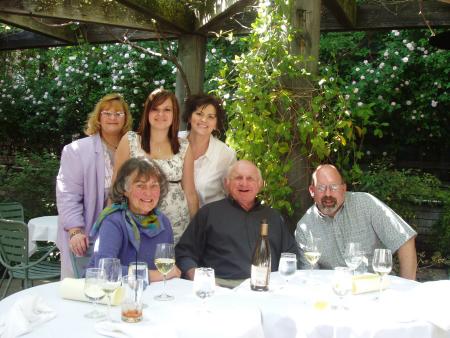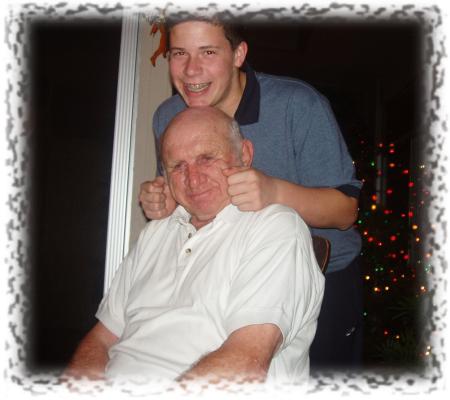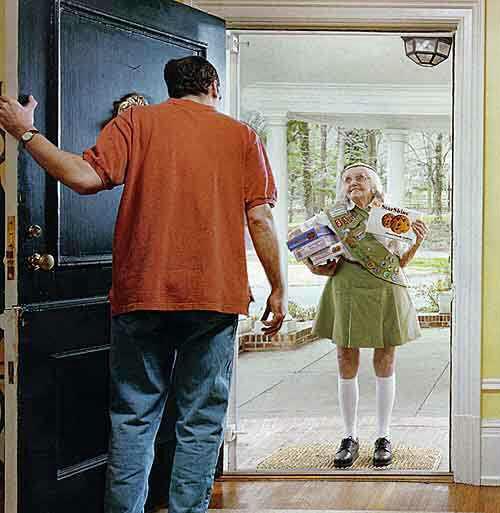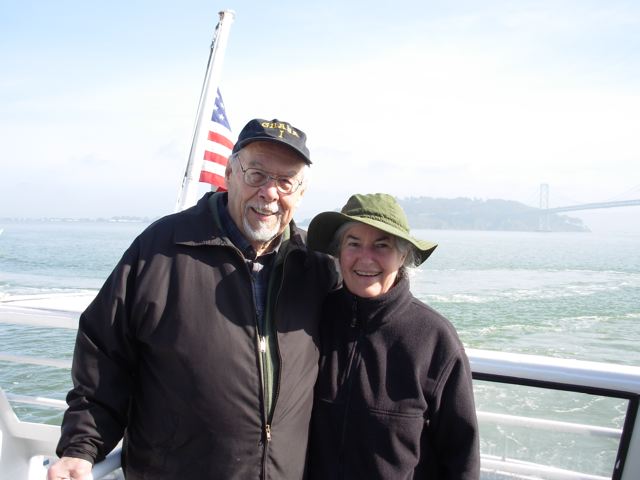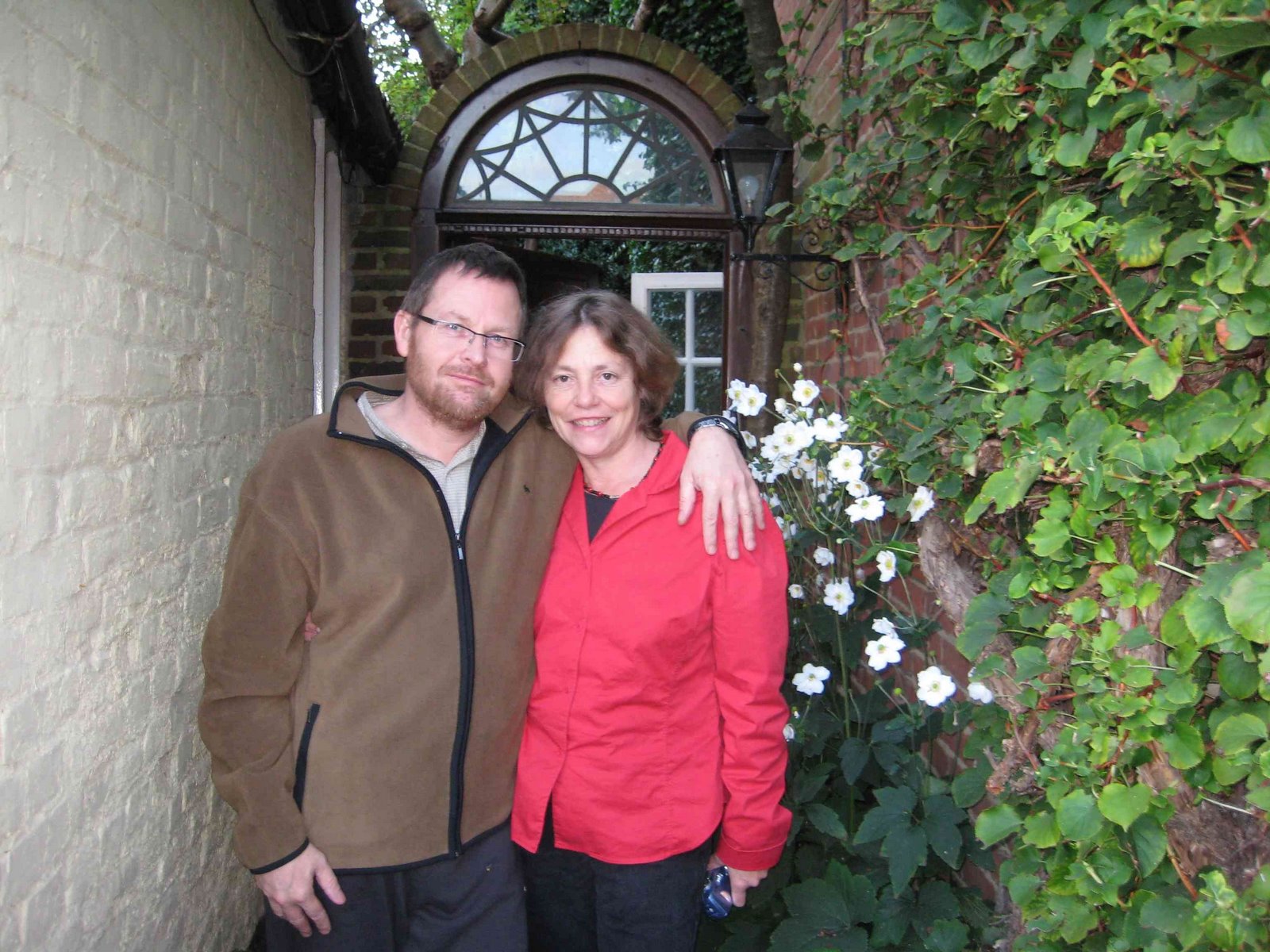Saturday, September 18, 2010
Wednesday, July 28, 2010
Sunday, April 25, 2010
Netflix Review - Summer Hours
On reflection we like this film more and more. It is about letting go of the past, the cultural and social changes in France, and for that matter all of Europe. Will we be sorry we threw away humble belongings that meant something to our parents in a headlong rush towards freedom to move from place to place and embrace the new? Are we to be frozen in place in our homes and be "curators of our own belongings"? The top review on this site by "RJP" can't be improved on. I would just add that there is a lot of dialog in the beginning, very fast French and subtitles whipping by. I love hearing French spoken but this took some effort. I loved the honesty of the film, no bad guys, just difficult decisions from a family with different needs. I thought the daughter interesting as she was almost "American" now -- how the siblings felt about that. I loved the fact that the offspring were conflicted in their views about the artwork of the almost too much adored (by their mother) uncle. It was interesting that their suspicions about the relationship were true but none of them wanted to accept or think about it. It was an amusing touch that the family housekeeper walked away (after having been given a free choice of what she wanted) with what she felt was not a valuable vase and was, on the contrary, extremely valuable. I loved the bit at the end when the older sibling visited the Musee d'Orsay to see their mother's objects (that had been donated as mother wished) displayed in a very stark, but effective, setting that exposed the full beauty of the furniture - but it looked "caged". Here is a film that raises many important questions and is far from just being a French language movie to pigeonhole as such. APR10
Sunday, February 21, 2010
Netflix Review of "The Boys Are Back"
We enjoyed this film a lot. Although it is annoying to watch the father (Clive Owen) indulging his younger son, it makes sense and you see Owen developing a better awareness of what is involved in being a father. We especially liked his growing relationship with his older son and how the father didn't give up after setbacks. We liked the photography and sense of place in the film and although it is slow and you don't agree with all his choices, we think it made a lot of sense and was absorbing to watch. FEB10
Thursday, January 28, 2010
Think Government's Bad? Try doing without.
This is the morning after the 2010 State of the Union Speech by Barack Obama. I decided to add the story below to my blog because it is so descriptive of why we need government:
Tuesday, October 27, 2009 (SF Chronicle)
Well, it's also your government, and to appreciate what that means, all you have to do is go outside and stand in front of where you live or work.
First, the sidewalk I'm standing on was poured and paved by city
government. So were Stanyan and Waller streets and all the streets running parallel and perpendicular to them. The sewers below are the work of government, as are the Municipal Railway power lines running above, the buses attached to the lines and the traffic lights, crosswalks, lanes (both auto and bicycle) and signs directing the traffic flow.
Drivers and the cars they operate are licensed by government. Automobile safety regulations, highway safety standards are all set by government.
Across Stanyan stands a McDonald's, its meat, dairy and other food
products subject to government inspection. Its food preparation is
examined by city health inspectors.
Next to the restaurant is a row of apartment buildings, all kept livable in adherence to government building codes and zoning regulations. Pipes bringing water in and sewage out of the apartments are financed and maintained by government. So are the streetlights.
Behind me is Golden Gate Park, a thousand acres of city-owned,
city-maintained parklands, set aside for the enjoyment of San Francisco's 750,000 residents and visitors from around the world. The park contains gardens, hiking trails, bike paths, a children's play area.
At the northern edge of the park is government-run Kezar Stadium, used for high school track meets and football games (and used by thousands of freelance joggers in between).
Behind Kezar is the San Francisco Police Department's Park precinct, providing public safety for citizens of the Haight and denizens of Golden Gate Park. Next to me is a call box for the San Francisco Fire Department.
On the hillside up Parnassus Street looms UCSF, where government-financed medical research, training for doctors, nurses and paraprofessionals takes place.
Overhead a commercial jetliner flies westward from
government-owned SFO, conforming to safety regulations of the Federal Aviation Administration, the guidance of federal air traffic controllers and the protection of federal air marshals and Homeland Security contractors.
You get the picture. We live in a civilized society with an array of
sophisticated public services (this account didn't even include the
military). Those who claim they don't need government should try living one day without it. Then, it is hoped, they'll stop advocating its starvation and pay their share.
Jeff Gillenkirk is a San Francisco writer. His novel, "Home, Away," will
be published in April by Chin Music Press.
Copyright 2009 SF Chronicle
Tuesday, October 27, 2009 (SF Chronicle)
Well, it's also your government, and to appreciate what that means, all you have to do is go outside and stand in front of where you live or work.
First, the sidewalk I'm standing on was poured and paved by city
government. So were Stanyan and Waller streets and all the streets running parallel and perpendicular to them. The sewers below are the work of government, as are the Municipal Railway power lines running above, the buses attached to the lines and the traffic lights, crosswalks, lanes (both auto and bicycle) and signs directing the traffic flow.
Drivers and the cars they operate are licensed by government. Automobile safety regulations, highway safety standards are all set by government.
Across Stanyan stands a McDonald's, its meat, dairy and other food
products subject to government inspection. Its food preparation is
examined by city health inspectors.
Next to the restaurant is a row of apartment buildings, all kept livable in adherence to government building codes and zoning regulations. Pipes bringing water in and sewage out of the apartments are financed and maintained by government. So are the streetlights.
Behind me is Golden Gate Park, a thousand acres of city-owned,
city-maintained parklands, set aside for the enjoyment of San Francisco's 750,000 residents and visitors from around the world. The park contains gardens, hiking trails, bike paths, a children's play area.
At the northern edge of the park is government-run Kezar Stadium, used for high school track meets and football games (and used by thousands of freelance joggers in between).
Behind Kezar is the San Francisco Police Department's Park precinct, providing public safety for citizens of the Haight and denizens of Golden Gate Park. Next to me is a call box for the San Francisco Fire Department.
On the hillside up Parnassus Street looms UCSF, where government-financed medical research, training for doctors, nurses and paraprofessionals takes place.
Overhead a commercial jetliner flies westward from
government-owned SFO, conforming to safety regulations of the Federal Aviation Administration, the guidance of federal air traffic controllers and the protection of federal air marshals and Homeland Security contractors.
You get the picture. We live in a civilized society with an array of
sophisticated public services (this account didn't even include the
military). Those who claim they don't need government should try living one day without it. Then, it is hoped, they'll stop advocating its starvation and pay their share.
Jeff Gillenkirk is a San Francisco writer. His novel, "Home, Away," will
be published in April by Chin Music Press.
Copyright 2009 SF Chronicle
Thursday, January 14, 2010
The Van Akens 2009
Mark and Dolores Van Aken -- I have been trying to add their edited photo to their Netflix site today. This is a test!
Thursday, January 7, 2010
Christmas is Over!
Well, all the decorations have been stored away for another year and it is extremely pleasant to have the house back to a simpler state.
For local neighbors, I might suggest a new Ning website called: www.greenridgecv.ning.com . I didn't realize that "Ning" is evidently a social networking site and I already had a sign-in password I was using for the Netflix Community site (This is a site separate from Netflix for sharing info).
For local neighbors, I might suggest a new Ning website called: www.greenridgecv.ning.com . I didn't realize that "Ning" is evidently a social networking site and I already had a sign-in password I was using for the Netflix Community site (This is a site separate from Netflix for sharing info).
Tuesday, January 5, 2010
January Book Group Selection
My rating: 3 of 5 stars
I found this book readable and interesting once I put on my "protection from relentless pain and cruelty" shield. I agree with one reviewer here who called it an "Atonement" wannabe. Still, I guess it was realistic enough. I couldn't recommend it. Just read it because it was a Book Group pick.
View all my reviews >>
Monday, January 4, 2010
Have a life? Have a blog?
I got three emails today advising me to update this blog. Son Greg tells me that if you post only once a week (or month?) you don't really have a blog. If you post several times a week, you don't have a life. OK, as soon as the Christmas stuff gets put away! Now I'll just post a picture of us this summer at the Cajun Music Sunday at Chouinard's Winery up Palomares Road! With us is June Wallace, Bruce Roeding and Ruben Anderson -- his wife Lillian is taking the picture.
Monday, December 14, 2009
"Infidel" by Ayaan Hirsi Ali
My rating: 5 of 5 stars
I have been reading here (http://www.goodreads.com/) through other reviews, especially the ones who rated it low. Hirsi Ali has a way of remembering her childhood so vividly you feel you are experiencing it with her. You follow her emotional and rational life step by step until she reaches the point of apostasy.
For those who say Islam is similar to all religions, and time will soften the rough edges, I say look at her statistics. In just two regions of Holland they collected statistics of girls killed by their families in "honor killings" -- it came to 11 girls in one year -- out of what, 40 regions? In Holland? In this day and age? As she says, how long does a young girl have to wait? Looking at statistics from all over the world, I would agree with Hirsi Ali that this is a major issue of our time.
View all my reviews >>
Sunday, November 8, 2009
Lionsgate releases "The Dead"
Lionsgate released "The Dead" on video to a chorus of complaints that 10 vital minutes in the beginning of the film were inexplicably missing. They have recalled the DVD and will re-release the video later in November of 2009.
Here are some reasons to love this production:
James Joyce's "The Dead"—the final story in Dubliners—is considered one of the great short stories. It was also considered impossible to translate to film. It's a story of thoughts and interior monologues, a period piece without melodrama or pretty much anything in the way of action. The story climaxes with a middle-aged woman weeping over a memory of lost love triggered by hearing a folk song, and her husband ruminating to himself about the meaning of life. How could this ever be filmic and true to the spirit of Joyce?
It's the stuff of legend now—Huston directing from an oxygen tent, would not live to see the film's December 1987 release. His son, Tony, wrote the script (and received an Oscar nomination) and served as his father's assistant. Huston's daughter, Anjelica, was cast in the pivotal role of Gretta, and her scenes at the end—her quiet, pained reverie on hearing the song, and later, her emotional telling of the story of a young man who died for love of her—are just beautiful.
Donal McCann is very good as the slightly too-assured and responsible Gabriel. McCann is tasked with delivering the closing monologue, an almost five-minute speech taken almost verbatim from the story, which plays over simple scenes of a snowfall mixed shots of the actor's face and the character's thoughts and memories of the evening. Wisely, McCann and Huston let the words speak for themselves; as such, the words retain their power, unadorned.
Many of the roles are played by Irish stage actors and actresses (though Carroll is originally from Scotland), and their modestly heartfelt and authentic performances fit the bill very well. Huston's camera is unobtrusive, like another party guest, gliding from this face to that, panning slowly to an old woman's face as her eyes sparkle with the memory of an exceptional tenor she once heard, slipping at one point away and peeking around a room at the souvenirs of a life, the inconsequential things that tell so much about people. Huston knows these people, and he presents them with such affection. Through small talk and quiet interactions, Huston opens up an entire world, and by the end, these people are as familiar as they'd be if we'd always known them.
Here are some reasons to love this production:
James Joyce's "The Dead"—the final story in Dubliners—is considered one of the great short stories. It was also considered impossible to translate to film. It's a story of thoughts and interior monologues, a period piece without melodrama or pretty much anything in the way of action. The story climaxes with a middle-aged woman weeping over a memory of lost love triggered by hearing a folk song, and her husband ruminating to himself about the meaning of life. How could this ever be filmic and true to the spirit of Joyce?
It's the stuff of legend now—Huston directing from an oxygen tent, would not live to see the film's December 1987 release. His son, Tony, wrote the script (and received an Oscar nomination) and served as his father's assistant. Huston's daughter, Anjelica, was cast in the pivotal role of Gretta, and her scenes at the end—her quiet, pained reverie on hearing the song, and later, her emotional telling of the story of a young man who died for love of her—are just beautiful.
Donal McCann is very good as the slightly too-assured and responsible Gabriel. McCann is tasked with delivering the closing monologue, an almost five-minute speech taken almost verbatim from the story, which plays over simple scenes of a snowfall mixed shots of the actor's face and the character's thoughts and memories of the evening. Wisely, McCann and Huston let the words speak for themselves; as such, the words retain their power, unadorned.
Many of the roles are played by Irish stage actors and actresses (though Carroll is originally from Scotland), and their modestly heartfelt and authentic performances fit the bill very well. Huston's camera is unobtrusive, like another party guest, gliding from this face to that, panning slowly to an old woman's face as her eyes sparkle with the memory of an exceptional tenor she once heard, slipping at one point away and peeking around a room at the souvenirs of a life, the inconsequential things that tell so much about people. Huston knows these people, and he presents them with such affection. Through small talk and quiet interactions, Huston opens up an entire world, and by the end, these people are as familiar as they'd be if we'd always known them.
Sunday, November 1, 2009
Saturday, October 31, 2009
Review of "Cheri" for Netflix
I enjoyed this tremendously and Sal found it disturbing and somewhat boring. What can I say? I was madly in love with Colette and all her novels and writings as a teenager -- especially Cheri and the Last of Cheri. I felt Michelle Pfeiffer was a little too much the modern idea of a beautiful woman. I imagined Lea as a plush, comfortable woman (like Polly Walker from the series "Rome") who dealt with the loss of Cheri with more equanimity - as a woman ready to give up all the work of being constantly attractive to a man, letting herself go. Anyhow, the basic premise is fascinating -- a totally babied and cosseted young man is totally unprepared for life and cannot and will not face it. It is supposed to be a sad story. I thought Rupert Fried was perfect for the role. In fact, none of the reviews prepared me for the fact I did indeed very much enjoy this film though it could have been better.
Friday, October 30, 2009
Review of movie "Gone Baby Gone"
We watched this tonight while channel surfing. This was our second viewing of the movie and if possible, was even more engrossing because now we knew the ending, we could re-evaluate the whole story. This was a great movie! Casey Affleck was so good as the young, sure-of-himself young man, Amy Ryan perfection as the airhead, druggy mother. This was good casting for so many actors, Ed Harris, Morgan Freeman, and so much fun to see Michael K. Williams in another role after playing Omar in The Wire. The setting of Boston was a great realistic backdrop for the story. The basic conundrum of the story makes you feel sad for a long time. OCT09
Thursday, October 22, 2009
Colds and Flu
THIS IS A KEEPER TO REFER TO
H1N1 flu is about to be upon us and we need to be on top of information regarding it. Here is a comparison to the normal cold symptoms that was sent to me. I'm not sure how accurate it is.
Know the Difference between Cold and H1N1 Flu Symptoms
Fever -- Fever is rare with a cold. Fever is usually present with the flu in up to 80% of all flu cases. A temperature of 100°F or higher for 3 to 4 days is associated with the flu.
Coughing -- A hacking, productive (mucus- producing) cough is often present with a cold. A non-productive (non-mucus producing) cough is usually present with the flu (sometimes referred to as dry cough).
Aches -- Slight body aches and pains can be part of a cold. Severe aches and pains are common with the flu.
Stuffy Nose -- Stuffy nose is commonly present with a cold and typically resolves spontaneously within a week. Stuffy nose is not commonly present with the flu.
Chills -- Chills are uncommon with a cold. 60% of people who have the flu experience chills.
Tiredness -- Tiredness is fairly mild with a cold. Tiredness is moderate to severe with the flu.
Sneezing -- Sneezing is commonly present with a cold. Sneezing is not common with the flu.
Sudden Symptoms -- Cold symptoms tend to develop over a few days. The flu has a rapid onset within 3-6 hours. The flu hits hard and includes sudden symptoms like high fever, aches and pains.
Headache -- A headache is fairly uncommon with a cold. A headache is very common with the flu, present in 80% of flu cases.
Sore Throat -- Sore throat is commonly present with a cold. Sore throat is not commonly present with the flu.
Chest Discomfort -- Chest discomfort is mild to moderate with a cold. Chest discomfort is often severe with the flu.
H1N1 flu is about to be upon us and we need to be on top of information regarding it. Here is a comparison to the normal cold symptoms that was sent to me. I'm not sure how accurate it is.
Know the Difference between Cold and H1N1 Flu Symptoms
Fever -- Fever is rare with a cold. Fever is usually present with the flu in up to 80% of all flu cases. A temperature of 100°F or higher for 3 to 4 days is associated with the flu.
Coughing -- A hacking, productive (mucus- producing) cough is often present with a cold. A non-productive (non-mucus producing) cough is usually present with the flu (sometimes referred to as dry cough).
Aches -- Slight body aches and pains can be part of a cold. Severe aches and pains are common with the flu.
Stuffy Nose -- Stuffy nose is commonly present with a cold and typically resolves spontaneously within a week. Stuffy nose is not commonly present with the flu.
Chills -- Chills are uncommon with a cold. 60% of people who have the flu experience chills.
Tiredness -- Tiredness is fairly mild with a cold. Tiredness is moderate to severe with the flu.
Sneezing -- Sneezing is commonly present with a cold. Sneezing is not common with the flu.
Sudden Symptoms -- Cold symptoms tend to develop over a few days. The flu has a rapid onset within 3-6 hours. The flu hits hard and includes sudden symptoms like high fever, aches and pains.
Headache -- A headache is fairly uncommon with a cold. A headache is very common with the flu, present in 80% of flu cases.
Sore Throat -- Sore throat is commonly present with a cold. Sore throat is not commonly present with the flu.
Chest Discomfort -- Chest discomfort is mild to moderate with a cold. Chest discomfort is often severe with the flu.
Cooking
I'm a lousy cook. Any recipe with more than 3 ingredients and over a paragraph of description and it becomes science fiction reading for me. My friend Dolores will often find an EXTREMELY simple recipe and give it to me. I love her pastina soup -- broth, pastina or orzo rice, shredded fresh zucchini -- boil a little, sprinkle on some parmesan. Heaven! I do love simple vegetable recipes (that's my assignment, along with cleanup). Sal usually decides what he'd like and cooks it and I always love it.
Wednesday, October 21, 2009
"Lean on Me" Twenty Years Later - Netflix Review
We saw this last night while channel surfing. It is hard to believe it's been twenty years since Morgan Freeman made this film. It is a rah-rah approach to the problems of the inner city schools, though, and time has proved the problem is more complicated, but Freeman is a joy to watch. His great sense of warmth and dignity may well be the reason we (some of us) feel comfortable with a black President. The story seems a little simplistic now -- for a real depiction of the problem of the decaying inner city school and the hapless students and teachers, you have to see "The Wire" -- season Four I think. Still, we enjoyed every minute of "Lean on Me" last night. The subject was discipline, not actual learning, but we are always suckers for this kind of story. OCT09
Monday, October 19, 2009
"Capitalism: A Love Story"
We fully support Michael Moore and always wish his films could be more successful. We came out of the theater yesterday feeling depressed. It is a sad situation -- the continuing and growing gap in this country between the very rich and the poor -- and the puzzling fact that the poor support the policies that are absolutely grinding them down and keeping them there. Moore genuinely cares that people should be given safeguards for their health, jobs and homes. But we felt he is making a weaker case for his views with each film he makes. We wanted so much for "Sicko" to have been a better film for instance. "Capitalism" misses the mark somehow. Despite his valiant efforts, I can't see the very people he is trying to help abandoning Fox News, Glenn Beck, Rush Limbaugh, Bill O'Reilly, Lou Dobbs, Pat Buchanan, Sarah Palin. These people have a firm grip on the psyche of people who want to blame their problems on immigrants, "welfare cheats", people who are pro-choice, Hollywood degeneration of morals and god knows what else rather than see that they are being manipulated. Still, he keeps trying. We can only hope he doesn't give up. But the subject here, especially the specifics of the Bailout/Goldman Sachs, etc. seems too big, too global. Moore is hoping that people wake up, take control, stay in their homes, fight the system. He interviews several churchmen who discuss how greed and the tenets of Christianity don't mix. We need Michael Moore. I wish more people had been in the theater yesterday when we saw the movie.
Monday, October 12, 2009
Tosca Simulcast - with touches of Eurotrash
First I have to say we thought Saturday's (October 10) simulcast of Tosca at the Hayward Theater (I hope not too many more people will discover this wonderful place to see Opera) was the most exciting, emotional and physical production of Tosca we have ever seen! After reading the Tommasini (New York Times) and Ross (New Yorker) reviews we thought we were going to hate it.
ACT ONE: Too dark, but Karita Mattila and Marcelo Alvarez just tore up the stage with their passionate singing -- you could believe these were two mature lovers who adored each other. It was annoying that the painting Cavaradossi was working on, a Madonna, had one bare breast, nipple obvious. Well, you try to ignore it -- the singing is so good. When Gagnidze comes on as Scarpia, he is gangbusters!!!! A large figure at the head of the stairs with touches of Javert and Mussolini! Great presence, great voice (remember we are talking movie theater here). The Te Deum a bit of a downer with too many people squeezed into a little space. Did Scarpia have to kiss the black Madonna? Oh well, try to ignore that.
ACT TWO: Scarpia is terrific,but do they have to show him dallying with prostitutes? His great aria is sung with one blond lady obviously giving him a blow job. Worst thing in the opera to me. Totally distracting and annoying. Tosca/Mattila is wonderful. The death scene is OK. Wouldn't want to see it that way again, though. And Alex Ross is right, after the murder she just dithers around. Downer.
The intermission interviews were just wonderful too. Loved Susan Graham. Loved that she pointed out that Mattila was wearing brown contact lenses over her blue eyes to make Tosca a latin beauty.
The whole experience restores your faith in art and life.
ACT ONE: Too dark, but Karita Mattila and Marcelo Alvarez just tore up the stage with their passionate singing -- you could believe these were two mature lovers who adored each other. It was annoying that the painting Cavaradossi was working on, a Madonna, had one bare breast, nipple obvious. Well, you try to ignore it -- the singing is so good. When Gagnidze comes on as Scarpia, he is gangbusters!!!! A large figure at the head of the stairs with touches of Javert and Mussolini! Great presence, great voice (remember we are talking movie theater here). The Te Deum a bit of a downer with too many people squeezed into a little space. Did Scarpia have to kiss the black Madonna? Oh well, try to ignore that.
ACT TWO: Scarpia is terrific,but do they have to show him dallying with prostitutes? His great aria is sung with one blond lady obviously giving him a blow job. Worst thing in the opera to me. Totally distracting and annoying. Tosca/Mattila is wonderful. The death scene is OK. Wouldn't want to see it that way again, though. And Alex Ross is right, after the murder she just dithers around. Downer.
ACT Three -- kind of a downer watching the soldiers march around pointing their rifles. I liked the productions that show morning sun coming up over the ramparts of the Castel Sant'Angelo -- and it makes the shepherd's song more moving. Again, Mattila and Alvarez tear up the stage, though it somehow deflates his last arias with stage business. The ending is weird with Tosca stuck in mid-air. I'm glad Ross warned us about this. Also, Ross was right that she can't attack the blood-curdling verbal thrusts such as, "Davanti a lui tremava tutta Roma" (I love that Steve Dimick uses this line to prove that Scarpia's first name is Louie). Anyhow, her softer diction slurs over these -- but that's OK, she is a wonderful Tosca. We used to have (probably still do, somewhere in the garage) several old 33 1/3 recordings of Tosca and Leontyne Price won the prize for her shriek of "Mario, Mario" when she discovers he is dead.
Ah, we Tosca nuts are legion.
The whole experience restores your faith in art and life.
Thursday, October 8, 2009
The Memory Keeper's Daughter - Netflix Review
We got really misty-eyed. This movie (made for TV) might be manipulative and sentimental but it hits a strong chord. Dermot Mulroney gives up his Downs Syndrome baby because he had a tragedy in his past with a baby sister who had it. Emily Watson plays a woman who keeps and raises the baby. The baby brings her great happiness (and difficulties too). Mulroney's wife is gradually distanced from her miserable, conflicted husband. Their son grows up confused by the problems in his parents' lives. I haven't read the book, probably won't. But this is a powerful and satisfying movie. What's the moral? Maybe that being open with your closest loved ones and sharing the decisions is not always easy to do. OCT09
Subscribe to:
Posts (Atom)






